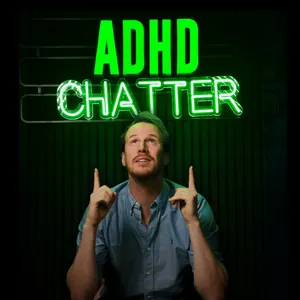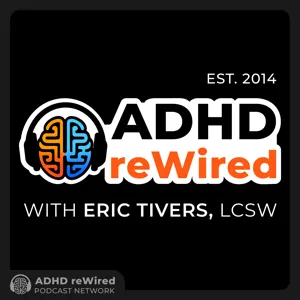Podcast Summary
Understanding and adapting to life's various aspects: Being adaptable and compassionate towards ourselves and others is essential when dealing with life's various aspects, from starting a new workout routine to celebrating special occasions, losing weight, or managing neurodivergent conditions.
Life's various aspects, whether it's starting a new workout routine during spring, celebrating Mother's Day, losing weight with personalized plans, or dealing with neurodivergent conditions, require understanding, flexibility, and acceptance. For instance, Peloton offers workout solutions for different schedules and fitness levels, making it easier to start a new routine during spring. 1-800-Flowers provides an opportunity to celebrate moms with various gifts, making Mother's Day special for them. Noom caters to individual preferences and dietary needs, enabling weight loss for those who struggle with traditional methods. Jay, a neurodivergent individual, shares the constant internal struggle between ADHD and autism, highlighting the complexities of managing such conditions. In all these situations, being adaptable and compassionate towards ourselves and others is crucial.
Neurodiversity in Relationships: A Key to Better Communication and Stronger Bonds: Recognizing neurodiversity in relationships can lead to improved communication and stronger bonds. Self-awareness and open communication are essential for neurodivergent individuals to navigate relationships and friendships effectively.
Understanding neurodiversity, specifically ADHD, in relationships can lead to better communication and stronger bonds. The speaker shared their personal experience of being diagnosed later in life and wishing they could go back and apply this newfound knowledge to past relationships. They also discussed the importance of recognizing one's own communication style and needs in friendships, as they may not align with societal expectations. The speaker identified themselves as a "low maintenance friend" and acknowledged the challenge of maintaining friendships that require frequent communication. They emphasized the value of friendships that can withstand long periods of absence and reconnect without judgment. Overall, the conversation highlighted the importance of self-awareness and open communication in navigating relationships and friendships, especially for those who are neurodivergent.
Neurodiversity: Unrecognized and Misunderstood: Earlier recognition and understanding of neurodiversity can provide valuable support during formative years, preventing feelings of isolation and misunderstanding.
Neurodiversity can manifest in various ways, and it often goes unnoticed or misunderstood. The speaker's experience of being diagnosed with ADHD as an adult led to a series of realizations about the importance of neurodiverse friendships and the impact of the pandemic on their mental health. The speaker's struggles, which included sensitivity to stimuli and difficulty focusing, were not recognized earlier due to societal perceptions of neurodiversity. Reflecting on their past, they identified being a loner in school despite being popular as a sign of their neurodivergence. The speaker believes that earlier recognition and understanding of neurodiversity could have provided valuable support during their formative years.
Masking in Social Situations Prevents Genuine Connections: Understanding neurodiversity and self-awareness can help reduce negative self-talk, form genuine relationships, and leverage strengths despite challenges.
People, including the speaker, can put on a mask or character in social situations, like at school or online, to get by, but it can prevent them from forming genuine connections and relationships. The speaker shares her experience of being friendly with everyone in school but leaving without any real friends. She also discusses her struggle with sharing more of herself on social media due to an internal barrier. The speaker's self-awareness and growth since her diagnosis have helped her understand that she is a driven and calculated person, and she advocates for herself better. Having an awareness of neurodiversity and understanding how one's brain works can help reduce negative self-talk and low self-esteem, and it's important to remember that there's no shame in the challenges that come with neurodiversity, as there are also tremendous strengths.
Recognizing and accommodating different love languages: Understanding and adapting to unique expressions and needs of love strengthens relationships
Understanding and accommodating different love languages and personal needs, especially during periods of overwhelm, is crucial for building strong relationships. Jay, for instance, requires space and understanding when he withdraws, which is a sign of him rebooting rather than being upset or distant. While some people express love through touch and conversation, others, like Jay, may not naturally exhibit these behaviors. It's essential to recognize and respect these differences to foster meaningful connections. Additionally, it takes time and effort to build a deep bond, and small gestures, like acknowledging someone's love or offering a hug when it's not the norm, can significantly strengthen the relationship. Ultimately, being open to learning and adapting to the unique needs and expressions of love from those around us is key to creating and nurturing strong, healthy relationships.
Communicating Effectively with a Partner who has ADHD: Approach communication with empathy, understanding, and a focus on finding solutions rather than dwelling on personal feelings.
Effective communication is crucial in relationships, especially when one partner has ADHD. It's essential to understand that the person's behavior may not be intentional. Jay shared his experience of struggling with expressing feelings and starting conversations, but when confronted directly, he's able to communicate effectively. He advised looking past personal feelings and focusing on the issue at hand to navigate situations where ADHD might be a factor. Jay also emphasized the importance of understanding that ADHD is not a personal attack and finding ways to work together to find solutions. Regarding the use of headphones as a representation of ADHD, Jay explained that they serve as a safety blanket and help him navigate the world by blocking out distractions, which can be especially helpful for individuals with ADHD. The key takeaway is to approach communication with empathy, understanding, and a focus on finding solutions rather than dwelling on personal feelings.
Managing Misophonia with Headphones: People with misophonia rely on headphones to block out triggering sounds and maintain mental well-being
Some people, including the speaker, have a sensitivity to sounds, a condition known as misophonia. This condition causes an irrational response to certain sounds that can trigger strong emotions and physical reactions. For these individuals, using headphones to block out unwanted sounds is essential for managing their reactions and maintaining their mental well-being. The speaker shares how they have always relied on headphones to help them cope with sounds that overwhelm them and cause distress. They find comfort in the ability to drown out external noise and relax their mind for a moment. Misophonia can significantly impact daily life, making it important for those affected to have tools like headphones to help manage their reactions. The speaker also mentions that their ADHD medication does not help with managing misophonia.
The complex relationship between ADHD medication and individuals: ADHD medication can improve focus and stability, but finding the right one and dealing with side effects can be challenging. Some individuals may also experience regression without it.
ADHD medication can significantly improve focus and stability for those diagnosed with ADHD, but the experience is highly individualized and can come with side effects and challenges. For some, like the speaker, the medication may also allow autistic traits to become more pronounced. The speaker started taking ADHD medication about three years ago and found it transformative, providing control over their brain and energy levels. However, the process of finding the right medication and dosage was difficult and came with side effects, including depression and insomnia. Eventually, the speaker was able to find a medication that worked best for them, but the shortage led to a three-and-a-half month absence from the medication. Since then, the speaker has noticed a regression to their pre-medication state, which they describe as "shit." Overall, the speaker's experience highlights the complex and nuanced relationship between ADHD medication and the individuals who take it.
Living with ADHD and medication shortages: Dealing with ADHD and medication shortages can be challenging, impacting productivity, relationships, and daily tasks. Open communication and understanding between partners is crucial, as is awareness and support for individuals with ADHD.
Living with ADHD and experiencing medication shortages can be frustrating, challenging, and disruptive to daily life. It can impact productivity, relationships, and even simple tasks. The speaker shared her experience of dealing with the absence of her medication and the support she received from her partner. She also highlighted the importance of open communication and understanding between partners when dealing with ADHD. The speaker also mentioned the struggle with overthinking and rehearsing conversations, which is a common symptom of ADHD. Overall, the discussion emphasized the importance of awareness, understanding, and support for individuals with ADHD, especially during times of medication shortages.
Preparing for social situations: People with autism may rehearse and explain before social situations due to social cue difficulties. Eye contact challenges can be managed by focusing on someone's nose. Word recall and conversation overanalysis are common. Struggles with interrupting and joining conversations can cause anxiety, but everyone processes social situations differently.
Individuals with autism may engage in preemptive rehearsal and explanation before social situations due to difficulties with social cues. Eye contact is often challenging, and strategies like focusing on the bridge of someone's nose can help. Difficulties with word recall and overanalyzing conversations are also common experiences. Additionally, individuals with autism may struggle with interrupting others and knowing when to join conversations. These challenges can lead to self-criticism and anxiety, but it's important to remember that everyone processes social situations differently, and these experiences are not limited to individuals with autism.
Communication Styles and Their Impact on Effective Communication: Finding a balance between waiting for the right moment to speak and being mindful of others' conversation flow while also allowing for spontaneity and impulsivity in a healthy way is crucial for effective communication.
Effective communication can be challenging for some individuals due to differing communication styles. Some people may wait for the right moment to speak, while others may dominate the conversation. In the former case, individuals may feel frustrated when they are unable to interject and share their thoughts, leading to internal frustration. This can be particularly challenging when the speaker has already moved on to a new topic. Additionally, some people may have impulsive tendencies, such as making impulsive decisions or acting on impulse without considering the consequences. For instance, making an impulsive decision to book a last-minute trip can lead to exciting experiences but also unexpected challenges. It's essential to find a balance between waiting for the right moment to speak and being mindful of others' conversation flow while also allowing for spontaneity and impulsivity in a healthy way.
Mother's Day Savings and Health Insurance: Celebrate Mom with Whole Foods deals and secure peace of mind with UnitedHealthcare's health insurance
Whole Foods Market offers unbeatable savings for Mother's Day shopping, with discounts on body care and candles, affordable tulips, and special treats. Meanwhile, UnitedHealthcare's Health ProtectorGuard fixed indemnity insurance plans help manage medical expenses with supplemental coverage and fewer restrictions. In the ever-changing world, the need for quality health insurance remains constant. And, as technology evolves, companies like UnitedHealthcare continue to make insurance more accessible and convenient. So, this Mother's Day, celebrate the special woman in your life with thoughtful gifts from Whole Foods Market, and ensure peace of mind with comprehensive health insurance from UnitedHealthcare.








